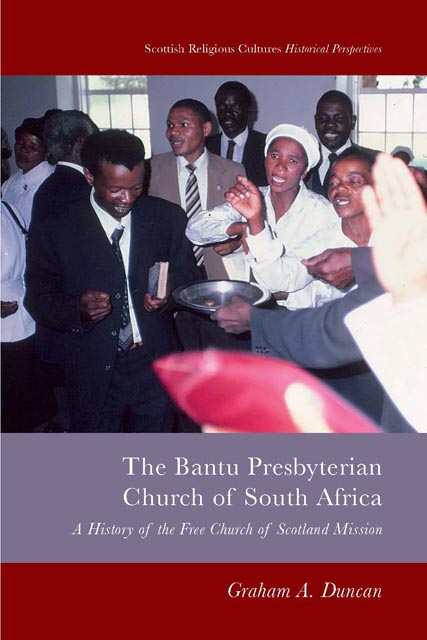Book contents
- Frontmatter
- Contents
- Acknowledgements
- Timeline
- A Presbyterian Anthem
- Introduction
- 1 Background to this Study
- 2 The Origins and Early Development of Scottish Presbyterian Mission in South Africa, 1824–65
- 3 Rev. Tiyo Soga (1829–71): A Paragon of Early Indigenous Leadership
- 4 The Role of Mission Councils in the Scottish Mission in South Africa, 1864–1923
- 5 The Rev. Edward Tsewu’s Dispute with the Free Church of Scotland Mission
- 6 The Mzimba Secession, 1898: A South African ‘Disruption’
- 7 Presbyterianism in South Africa, 1897–1923: To Unite orNot to Unite?
- 8 Preparations for the Formation of the Bantu Presbyterian Church of South Africa, 1897–1919
- 9 The Formation of the Bantu Presbyterian Church of South Africa, 1920–3
- 10 Mission to Church – Church to Mission: The First Ten Years, 1923–33
- 11 Reaching Out: The Bantu Presbyterian Church in South Africa and the Presbyterian Church of South Africa and Ecumenism, 1923–39
- 12 The Bantu Presbyterian Church in South Africa and Ecumenism, 1940–99
- 13 The End of Mission Councils: The Church of Scotland South Africa Joint Council, 1971–81
- 14 A Young Church in Mission or Maintenance Mode?: The Bantu Presbyterian Church of South Africa, 1923–99
- 15 The Bantu/Reformed Presbyterian Church and Socio-political Issues
- 16 Bantu/Reformed Presbyterian ChurchWomen in Leadership in Ministry
- Conclusion: Indigenous Presbyterians and Missionaries –Transferring Contending Roles and Responsibilities
- Bibliography
- Index
5 - The Rev. Edward Tsewu’s Dispute with the Free Church of Scotland Mission
Published online by Cambridge University Press: 26 November 2022
- Frontmatter
- Contents
- Acknowledgements
- Timeline
- A Presbyterian Anthem
- Introduction
- 1 Background to this Study
- 2 The Origins and Early Development of Scottish Presbyterian Mission in South Africa, 1824–65
- 3 Rev. Tiyo Soga (1829–71): A Paragon of Early Indigenous Leadership
- 4 The Role of Mission Councils in the Scottish Mission in South Africa, 1864–1923
- 5 The Rev. Edward Tsewu’s Dispute with the Free Church of Scotland Mission
- 6 The Mzimba Secession, 1898: A South African ‘Disruption’
- 7 Presbyterianism in South Africa, 1897–1923: To Unite orNot to Unite?
- 8 Preparations for the Formation of the Bantu Presbyterian Church of South Africa, 1897–1919
- 9 The Formation of the Bantu Presbyterian Church of South Africa, 1920–3
- 10 Mission to Church – Church to Mission: The First Ten Years, 1923–33
- 11 Reaching Out: The Bantu Presbyterian Church in South Africa and the Presbyterian Church of South Africa and Ecumenism, 1923–39
- 12 The Bantu Presbyterian Church in South Africa and Ecumenism, 1940–99
- 13 The End of Mission Councils: The Church of Scotland South Africa Joint Council, 1971–81
- 14 A Young Church in Mission or Maintenance Mode?: The Bantu Presbyterian Church of South Africa, 1923–99
- 15 The Bantu/Reformed Presbyterian Church and Socio-political Issues
- 16 Bantu/Reformed Presbyterian ChurchWomen in Leadership in Ministry
- Conclusion: Indigenous Presbyterians and Missionaries –Transferring Contending Roles and Responsibilities
- Bibliography
- Index
Summary
Introduction
Within South African Presbyterianism, the Mzimba Secession is relatively well known. What is far less well known is that in 1896, two years before Mzimba's secession, there was another disruption within Presbyterian church life in Johannesburg led by Rev. Edward Tsewu. This occurred within the context of the growing phenomenon of Ethiopianism as part of the African Initiated Church (AIC) movement. To understand the broader context of this movement it is necessary to take a brief detour into the circumstances which led to this development.
The African Initiated Church Movement
The origin and development of AICs were ‘… a part of the broad and long term process of national politico-economic emancipation’ (Lamola 1988: 6; Claasen 1995: 15) which was based on ‘self-reliance and refusal of foreign financial support’ (Pretorius & Jafta 1997: 211). This was a period which witnessed mass migration to cities for work (Christian Express [CE] May 1895: 1): ‘AICs arose in the context of growing industrialisation as blacks from all race groups met in the workplace, talked, interacted and developed a “National Spirit” which was susceptible to being transferred into the ecclesiastical realm as a protest against this form of colonialism – capitalism’ (Duncan 1997: 75). This ‘resulted from being tied to the political economy of dominant capitalism’ (Duncan 1997: 76). But there were other factors at work which affected the economic situation.
In 1894 alone the country suffered from drought with the consequent great loss of cattle, horses and grain for ‘natives’. This was followed by the rinderpest pandemic in 1896–7 (Comaroff & Comaroff 1997: 209). The credit system was a contributing factor which led to impoverishment (CE May 1895: 1). The primary issue was ‘Africans dispossession from the land, the dispersal of groups from their homelands, the lack of legal resources, unemployment, starvation wages, poor education, poor urban housing, and police mistreatment of Africans’ (Pretorius & Jafta 1997: 213). These were predominantly economic matters. This provided an economic context for the formation of AICs.
The Witwatersrand was the key industrial centre and also that part of the country experienced the most secessions from white churches. It was unacceptable for them to find that simultaneously the church was an agent of the process of dehumanisation and exploitation in the religious realm.
- Type
- Chapter
- Information
- Bantu Presbyterian Church of South AfricaA History of the Free Church of Scotland Mission, pp. 57 - 70Publisher: Edinburgh University PressPrint publication year: 2022



